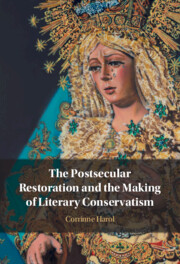Book contents
- The Postsecular Restoration and the Making of Literary Conservatism
- The Postsecular Restoration and the Making of Literary Conservatism
- Copyright page
- Contents
- Acknowledgments
- Introduction
- Part I Political and Fictional Relations
- Part II Postsecular Literary Experiences
- Part III Political Agents and Novel Forms
- Chapter 5 Passivity
- Chapter 6 Revolution and Nostalgia
- Coda
- Bibliography
- Index
Chapter 6 - Revolution and Nostalgia
Walter Scott and the Forms of Jacobite Nostalgia
from Part III - Political Agents and Novel Forms
Published online by Cambridge University Press: 22 June 2023
- The Postsecular Restoration and the Making of Literary Conservatism
- The Postsecular Restoration and the Making of Literary Conservatism
- Copyright page
- Contents
- Acknowledgments
- Introduction
- Part I Political and Fictional Relations
- Part II Postsecular Literary Experiences
- Part III Political Agents and Novel Forms
- Chapter 5 Passivity
- Chapter 6 Revolution and Nostalgia
- Coda
- Bibliography
- Index
Summary
“Revolution and Nostalgia: Walter Scott, and the Forms of Jacobite Nostalgia,” examines the concept of revolution in relation to the events of 1688–89 by way of thinking about why this paradigmatic event of modernity – the first “modern” revolution on some accounts – only very hesitantly embraces the idea of revolution. It examines the figure of the Jacobite in Walter Scott’s Waverley, in order to argue that historical fiction works by a logic of nostalgia, structuring the past as the place of the fantasies of the present. This chapter explains why revolution becomes the central if disavowed political fantasy of secular modernity; why nostalgia, a word invented in 1688 and reaching its apotheosis and its formal incarnation as historical fiction over a hundred years later, haunts the project of secularity; and why the Jacobite is at once the exemplary revolutionary, the prototypical nostalgic, and the object of nostalgic investment. This chapter also explains why representations of the “revolution” of 1688–89 tend to allegorize it in terms of racial or colonial conflict and thus how the invention of the Highland rebel managed England’s ambivalence about its own experience with revolution and its colonization projects.
- Type
- Chapter
- Information
- Publisher: Cambridge University PressPrint publication year: 2022



